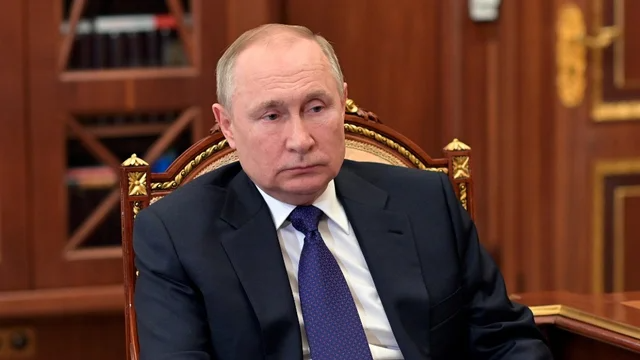Putin wants ‘unfriendly countries’ to pay rubles for gas, what does it mean and what impact will it bring?


President Vladimir Putin said Wednesday Russia will only accept payments in rubles for gas deliveries to “unfriendly countries”, which include all EU members, after Moscow was hit by unprecedented sanctions over Ukraine. Vladimir Putin has passed legislation that would force EU to buy Gas only in Rubles.
“I have decided to implement a set of measures to transfer payment for our gas supplies to unfriendly countries into Russian rubles,” Putin said during a televised government meeting.
What happens now?
EU has to buy Rubles from the Market and that would strengthen the Ruble. The Ruble has already bounded from 137 Rubles to 1 USD at its lowest peak to 98.50 Rubles to 1 USD in a matter of days. This further helps the Ruble. Immediately after his announcement, the ruble — which has plummeted since the start of the Ukraine conflict — strengthened against the dollar and euro, while gas prices rose.
It means no more Dollar Monopoly for the international oil market. I think that they are still able to operate in Euros, but Putin is not taking any risks. Currently, not only they had their assets in foreign banks frozen, but dollar reserves in Russia cannot be used for international payments. Its obvious that they won`t accept currency that they cannot operate with. And they have 13% of the Oil/Gas/Hydocarbons market. Several other countries had been accepting payment in other currencies, but this is in another scale.
And for the funny guy saying that “Rubles are dirt cheap”, international prices are constant, so it just means more rubles. This precisely when the US is increasing the Dollar offer as never before. You know what happens when offer highs and demand lows, right?
Putin ordered Russia’s central bank to implement the new payment system within a week, saying it must be “transparent” and will involve the purchase of rubles on Russia’s domestic market. Putin also hinted that other Russian exports may be affected. He added, however, that Russia will continue supplying the volume of gas outlined in its contracts.
Later Wednesday the Russian space agency Roscosmos announced it too will insist its international partners pay it in rubles.
“We will also conclude all our external agreements in rubles,” Roscosmos head Dmitry Rogozin was quoted as saying by the official Tass news agency.
“It is clear that delivering our goods to the European Union, the United States and receiving dollars, euros, other currencies no longer makes sense to us,” Putin said.
Ukraine was quick to denounce Russia’s “economic war” on the EU and its efforts to “strengthen the ruble”.
“But the West could hit Russia with an oil embargo that would cause the Russian economy to plunge,” Ukrainian presidential advisor Andriy Yermak said on Telegram.
“This is now a key economic battle, and the West must collectively win it,” he added.
In theory, this should prop up the ruble’s exchange rate as there will be a significant demand for ruble from countries that are buying Russian gas (let’s say it aloud – this means mostly the European Union). It looks like a shrewd move by Russia as even the prospect of Europe needing to obtain a large quantities of rubles to pay for the gas (that, let’s face it, it sorely needs) could stop the free-fall of the Russian currency.
It could also backfire if Europe is able to buy rubles from somebody else than the Russian state – if for example it could buy rubles from foreign investors who happened to hold the currency, it would be these investors who would be getting the euros or dollars, and Russia would only get the rubles that are literally worthless for them. But I doubt there are international investors who hold substantial amounts of rubles, enough to cover European gas imports, so most rubles will have to be bought from Russia itself. This means that Russia still gets the foreign currency as if the gas was priced in EUR or USD, but it would have the unfortunate effect of stabilizing the ruble. European dependence on Russian fossil fuels is deeply troubling and having to trade in rubles would let Russia twist our arm even more. But the more it hurts, the stronger the impetus to end this dependence once and for all.
Russia has been moving to “de-dollarise” its economy for years, since the introduction of Western sanctions over its annexation of Crimea from Ukraine in 2014.
In March 2019, the Russia state energy giant Gazprom announced its first sale of gas for rubles to an unnamed western European company. Deputy Prime Minister Alexander Novak said Wednesday a shift to trading in the national currency would “increase reliability”. He warned that a full embargo on Russian oil and gas would lead to a “collapse” of the global energy markets and “unpredictable” spikes in prices.
Western countries have piled crippling sanctions on Moscow since it moved troops into Ukraine.
The West froze some $300 billion of Russia’s foreign currency reserves abroad, a move that Foreign Minister Sergei Lavrov on Wednesday described as “theft”. But while the United States banned the import of Russian oil and gas, the EU — which received around 40 percent of its gas supplies from Russia in 2021 — has retained deliveries from Moscow. Brussels, however, has set a target of slashing Russian gas imports by two-thirds by the end of the year and is eyeing an oil embargo.
DISCLAIMER: The author is solely responsible for the views expressed in this article. The author carries the responsibility for citing and/or licensing of images utilized within the text.
